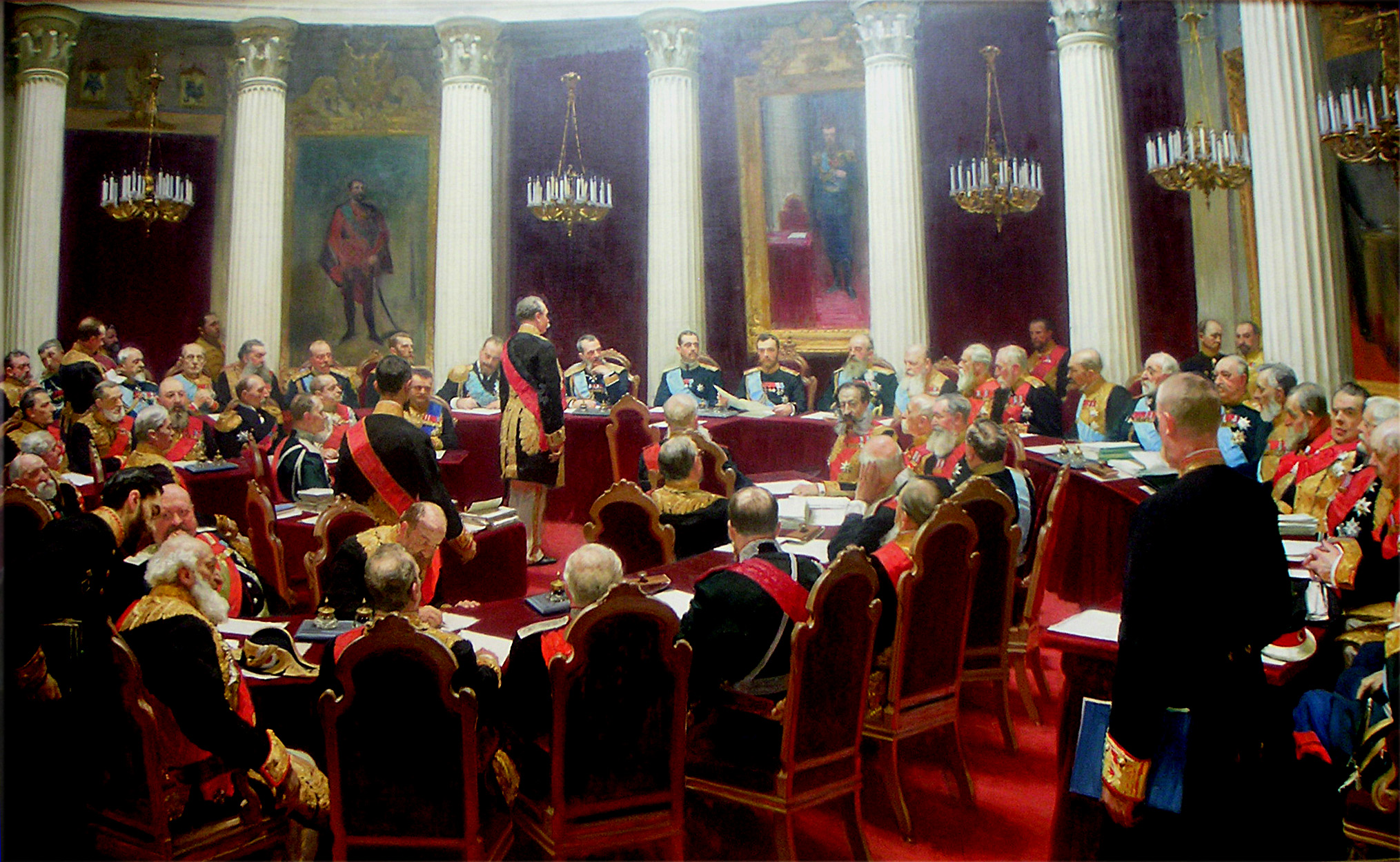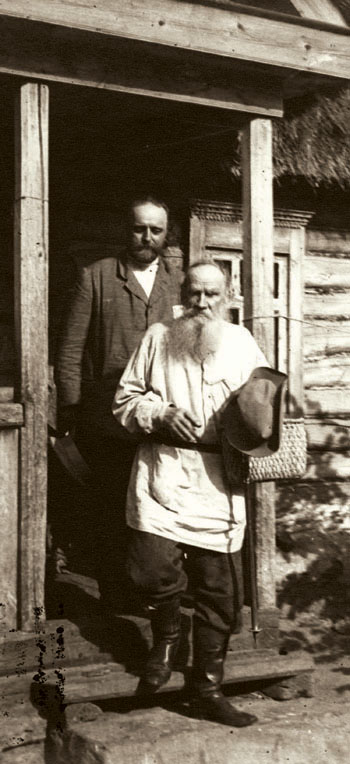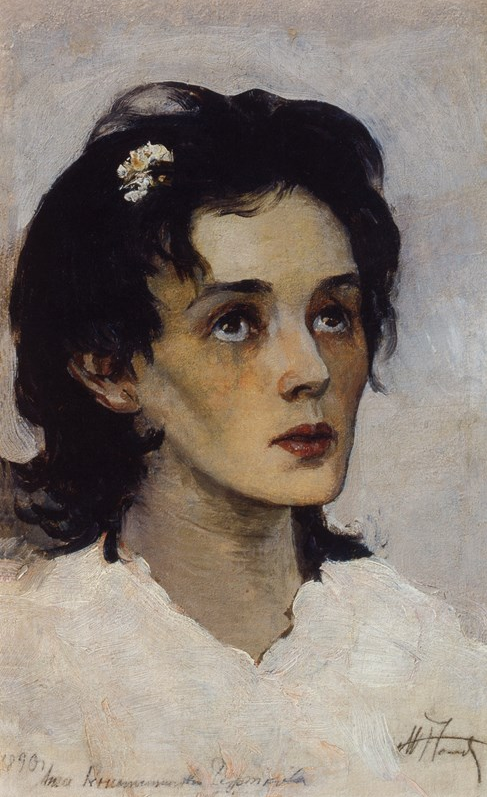|
Ivan Goremykin
Ivan Logginovich Goremykin (russian: Ива́н Лóггинович Горемы́кин, Iván Lógginovich Goremýkin) (8 November 183924 December 1917) was a Russian politician who served as the prime minister of the Russian Empire in 1906 and again from 1914 to 1916, during World War I. He was the last person to have the civil rank of Active Privy Councillor, 1st class. During his time in government, Goremykin pursued conservative policies. Biography Goremykin was born on 8 November 1839 into a noble family. In 1860 he completed studies at the Imperial School of Jurisprudence and became a lawyer in Saint Petersburg. In the Senate, Goremykin became responsible for agriculture in Congress Poland. In 1866 he was appointed as vice governor in Płock and in 1869 in Kielce. In 1891 he was appointed as deputy minister of justice, considered being an expert on the "peasant question". Within a year he moved to the Ministry of the Interior, becoming Minister from 1895-1899. A self ... [...More Info...] [...Related Items...] OR: [Wikipedia] [Google] [Baidu] |
Nicholas II Of Russia
Nicholas II or Nikolai II Alexandrovich Romanov; spelled in pre-revolutionary script. ( 186817 July 1918), known in the Russian Orthodox Church as Saint Nicholas the Passion-Bearer,. was the last Emperor of Russia, King of Congress Poland and Grand Duke of Finland, ruling from 1 November 1894 until his abdication on 15 March 1917. During his reign, Nicholas gave support to the economic and political reforms promoted by his prime ministers, Sergei Witte and Pyotr Stolypin. He advocated modernization based on foreign loans and close ties with France, but resisted giving the new parliament (the Duma) major roles. Ultimately, progress was undermined by Nicholas's commitment to autocratic rule, strong aristocratic opposition and defeats sustained by the Russian military in the Russo-Japanese War and World War I. By March 1917, public support for Nicholas had collapsed and he was forced to abdicate the throne, thereby ending the Romanov dynasty's 304-year rule of Russia (16 ... [...More Info...] [...Related Items...] OR: [Wikipedia] [Google] [Baidu] |
Saint Petersburg
Saint Petersburg ( rus, links=no, Санкт-Петербург, a=Ru-Sankt Peterburg Leningrad Petrograd Piter.ogg, r=Sankt-Peterburg, p=ˈsankt pʲɪtʲɪrˈburk), formerly known as Petrograd (1914–1924) and later Leningrad (1924–1991), is the second-largest city in Russia. It is situated on the Neva River, at the head of the Gulf of Finland on the Baltic Sea, with a population of roughly 5.4 million residents. Saint Petersburg is the fourth-most populous city in Europe after Istanbul, Moscow and London, the most populous city on the Baltic Sea, and the world's northernmost city of more than 1 million residents. As Russia's Imperial capital, and a historically strategic port, it is governed as a federal city. The city was founded by Tsar Peter the Great on 27 May 1703 on the site of a captured Swedish fortress, and was named after apostle Saint Peter. In Russia, Saint Petersburg is historically and culturally associated with t ... [...More Info...] [...Related Items...] OR: [Wikipedia] [Google] [Baidu] |
October Manifesto
The October Manifesto (russian: Октябрьский манифест, Манифест 17 октября), officially "The Manifesto on the Improvement of the State Order" (), is a document that served as a precursor to the Russian Empire's first Constitution, which was adopted the following year in 1906. The Manifesto was issued by Tsar Nicholas II (1868–1918, ruled 1894–1917), under the influence of Sergei Witte (1849–1915), on as a response to the Russian Revolution of 1905. Nicholas strenuously resisted these ideas, but gave in after his first choice to head a military dictatorship, [...More Info...] [...Related Items...] OR: [Wikipedia] [Google] [Baidu] |
Russian Constitution Of 1906
The Russian Constitution of 1906 refers to a major revision of the 1832 Fundamental Laws of the Russian Empire, which transformed the formerly absolutist state into one in which the emperor agreed for the first time to share his autocratic power with a parliament. It was enacted on 1906, on the eve of the opening of the first State Duma. This first-ever Russian Constitution was a revision of the earlier Fundamental Laws, which had been published as the Code of Laws of the Russian Empire (russian: Свод законов Российской империи, pre-1917 Russian orthography: ''Сводъ законовъ Россійской имперіи'') in 1832. It was granted during the Russian Revolution of 1905, in a last-ditch effort by the imperial government to preserve its own existence and keep the empire from disintegration. The new constitution provided for a bicameral Russian parliament, without whose approval no laws were to be enacted in Russia. This legislature ... [...More Info...] [...Related Items...] OR: [Wikipedia] [Google] [Baidu] |
Zemstvo
A ''zemstvo'' ( rus, земство, p=ˈzʲɛmstvə, plural ''zemstva'' – rus, земства) was an institution of local government set up during the great emancipation reform of 1861 carried out in Imperial Russia by Emperor Alexander II of Russia. Nikolay Milyutin elaborated the idea of the zemstva, and the first zemstvo laws went into effect in 1864. After the October Revolution the zemstvo system was shut down by the Bolsheviks and replaced with a multilevel system of workers' and peasants' councils ("soviets"). Structure The system of elected bodies of local self-government in the Russian Empire was represented at the lowest level by the mir and the volost and was continued, so far as the 34 Guberniyas (governorates) of old Russia were concerned, in the elective district and provincial assemblies (zemstvo). The goal of the zemstvo reform was the creation of local organs of self-government on an elected basis, possessing sufficient authority and independence to re ... [...More Info...] [...Related Items...] OR: [Wikipedia] [Google] [Baidu] |
Tolstoyan Movement
The Tolstoyan movement is a social movement based on the philosophical and religious views of Russian novelist Leo Tolstoy (1828–1910). Tolstoy's views were formed by rigorous study of the ministry of Jesus, particularly the Sermon on the Mount. Tolstoy expressed "great joy" that groups of people "have been springing up, not only in Russia but in various parts of Europe, who are in complete agreement with our views." However, the author also thought it was a mistake to create a specific movement or doctrine after him, urging individuals to listen to their own conscience rather than blindly follow his. In regard to a letter he received from an adherent, he wrote: Beliefs and practices Tolstoyans (Russian:''Толстовцы'', ''Tolstovtsy'') identify themselves as Christians, but do not generally belong to an institutional Church. Tolstoy was a harsh critic of the Russian Orthodox Church, leading to his excommunication in 1901. Tolstoyans tend to focus more on following ... [...More Info...] [...Related Items...] OR: [Wikipedia] [Google] [Baidu] |
Vladimir Chertkov
Vladimir Grigoryevich Chertkov (russian: Влади́мир Григо́рьевич Чертко́в; also transliterated as Chertkoff, Tchertkoff, or Tschertkow ( – November 9, 1936) was the editor of the works of Leo Tolstoy, and one of the most prominent Tolstoyans. After the revolutions of 1917, Chertkov was instrumental in creating the United Council of Religious Communities and Groups, which eventually came to administer the Russian SFSR's conscientious objection program. Life and career Family and childhood Chertkov was born in 1854 in St. Petersburg, Russia into a wealthy and aristocratic family. His mother (to whom he felt especially close), Elizaveta Ivanovna, born Countess Chernysheva-Kruglikova, was known among her circle in St. Petersburg society for her beauty, intellect, authoritativeness and tact. His father, Grigorii Ivanovich, was aide-de-camp under Nikolai I, Adjutant-General under Alexander II and Alexander III, known in military circles for his front-li ... [...More Info...] [...Related Items...] OR: [Wikipedia] [Google] [Baidu] |
Imperial Orthodox Palestine Society
The Imperial Orthodox Palestine Society (russian: Императорское православное палестинское общество, ИППО), is a scholarly organization for the study of the Middle East, founded on 8 May 1882 by , after the approval of Alexander III. The Society's activities expanded considerably so that it held over 30,000 meetings during 1902. It was reformed and reapproved in 1919, 1922, 1925, 1930, 1952, 1986, 1989, 1992, 2002 and 2003. In 1918, following the Russian Revolution of 1917, the society was renamed the Russian Palestine Society (Russian: ) and attached to the Academy of Sciences of the USSR. Its original name was restored by the society on 22 May 1992. Today it is active both within the Russian Federation as well as abroad. These branches operate in cities abroad: * Varna, (Bulgaria) * Bethlehem, Palestine * Jerusalem, Palestine * Kyiv, Ukraine * Larnaca, Cyprus * Amman, Jordan In September 2008, the government of Israel decided t ... [...More Info...] [...Related Items...] OR: [Wikipedia] [Google] [Baidu] |
Alexandra Fyodorovna Of Hesse
german: Alix Viktoria Helene Luise Beatrixrussian: Alexandra Feodorovna Romanova , house = Hesse-Darmstadt , father = Louis IV, Grand Duke of Hesse and by Rhine , mother = Princess Alice of the United Kingdom , birth_name = Princess Alix of Hesse and by Rhine , birth_date = 1872 , birth_place = New Palace, Darmstadt, Grand Duchy of Hesse, German Empire , death_date = , death_place = Ipatiev House, Yekaterinburg, Russian SFSR , burial_date = 17 July 1998 , burial_place = Peter and Paul Cathedral, Saint Petersburg, Russian Federation , signature = Alexandra Feodorovna Signature.svg , religion = Russian Orthodox ''prev.'' Lutheranism Alexandra Feodorovna ( – 17 July 1918), Princess Alix of Hesse and by Rhine at birth, was the last Empress of Russia as the consort of Emperor Nicholas II from their marriage on until his forced abdication on . A favourite granddaughter of Queen Victoria of the United Kingdom, she was, like her ... [...More Info...] [...Related Items...] OR: [Wikipedia] [Google] [Baidu] |
Autocracy
Autocracy is a system of government in which absolute power over a state is concentrated in the hands of one person, whose decisions are subject neither to external legal restraints nor to regularized mechanisms of popular control (except perhaps for the implicit threat of a coup d'état or other forms of rebellion). In earlier times, the term ''autocrat'' was coined as a favorable description of a ruler, having some connection to the concept of "lack of conflicts of interests" as well as an indication of grandeur and power. This use of the term continued into modern times, as the Russian Emperor was styled "Autocrat of all the Russias" as late as the early 20th century. In the 19th century, Eastern and Central Europe were under autocratic monarchies within the territories of which lived diverse peoples. Autocracy is the most common and durable regime type since the emergence of the state. History and etymology Autocracy comes from the Ancient Greek ''autos'' (Greek: αὐ ... [...More Info...] [...Related Items...] OR: [Wikipedia] [Google] [Baidu] |
Tsar
Tsar ( or ), also spelled ''czar'', ''tzar'', or ''csar'', is a title used by East Slavs, East and South Slavs, South Slavic monarchs. The term is derived from the Latin word ''Caesar (title), caesar'', which was intended to mean "emperor" in the European medieval sense of the term—a ruler with the same rank as a Roman emperor, holding it by the approval of another emperor or a supreme ecclesiastical official (the Pope or the Ecumenical Patriarch)—but was usually considered by western Europeans to be equivalent to "king". It lends its name to a system of government, tsarist autocracy or tsarism. "Tsar" and its variants were the official titles of the following states: * Bulgarian Empire (First Bulgarian Empire in 681–1018, Second Bulgarian Empire in 1185–1396), and also used in Kingdom of Bulgaria, Tsardom of Bulgaria, in 1908–1946 * Serbian Empire, in 1346–1371 * Tsardom of Russia, in 1547–1721 (replaced in 1721 by ''imperator'' in Russian Empire, but still re ... [...More Info...] [...Related Items...] OR: [Wikipedia] [Google] [Baidu] |
Kielce
Kielce (, yi, קעלץ, Keltz) is a city in southern Poland, and the capital of the Świętokrzyskie Voivodeship. In 2021, it had 192,468 inhabitants. The city is in the middle of the Świętokrzyskie Mountains (Holy Cross Mountains), on the banks of the Silnica River, in the northern part of the historical Polish province of Lesser Poland. Kielce has a history back over 900 years, and the exact date that it was founded remains unknown. Kielce was once an important centre of limestone mining and the vicinity is famous for its natural resources like copper, lead and iron, which, over the centuries, were exploited on a large scale. There are several fairs and exhibitions held in Kielce throughout the year. The city and its surroundings are also known for their historic architecture, green spaces and recreational areas like the Świętokrzyski National Park. In sports, the city is known as the home of the top-tier handball club, multiple Polish Champion and one-time EHF Champions Le ... [...More Info...] [...Related Items...] OR: [Wikipedia] [Google] [Baidu] |









